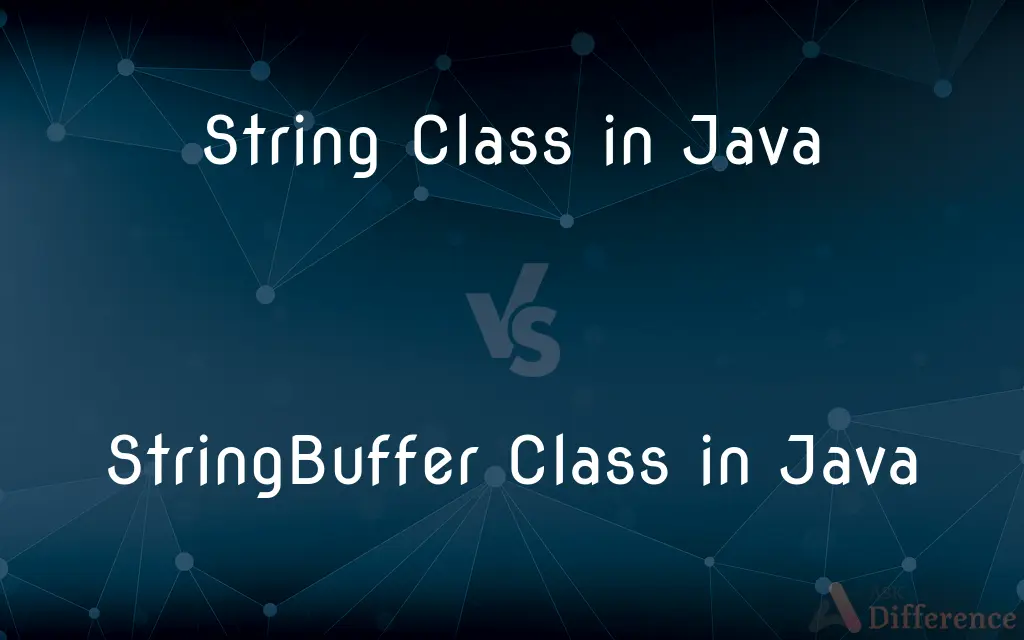String Class in Java vs. StringBuffer Class in Java — What's the Difference?
By Tayyaba Rehman — Published on January 2, 2024
String Class in Java creates immutable objects; modifications create new strings. StringBuffer Class allows mutable strings, enabling modifications without creating new objects.

Difference Between String Class in Java and StringBuffer Class in Java
Table of Contents
ADVERTISEMENT
Key Differences
String Class in Java represents immutable sequences of characters. Once created, their values cannot be changed. StringBuffer Class in Java, however, represents mutable sequences of characters, allowing changes without creating new objects.
String Class is generally faster and requires less heap memory when you have a fixed string that won't change. But, StringBuffer Class is more memory efficient when you need to modify a string frequently, as it avoids creating multiple string instances.
String Class objects are thread-safe due to their immutability, making them suitable for use in a multithreaded environment. In contrast, StringBuffer Class objects are also thread-safe, but their mutability requires synchronization, which can slightly reduce performance in multithreading.
String Class is ideal for simple, short, and fixed strings in Java applications. On the other hand, StringBuffer Class is better for strings that require frequent modifications, like in loops or when building dynamic strings.
String Class uses the String literal pool, which helps in reusing objects and saving memory. Conversely, StringBuffer Class does not use this pool, leading to more memory usage when creating new instances.
ADVERTISEMENT
Comparison Chart
Mutability
Immutable (cannot change after creation)
Mutable (can change after creation)
Memory Efficiency
More efficient for fixed strings
More efficient for frequently modified strings
Thread Safety
Thread-safe due to immutability
Thread-safe, but requires synchronization
Use Case
Ideal for fixed and short strings
Better for dynamic and frequently changed strings
Literal Pool Usage
Uses literal pool for memory efficiency
Does not use the literal pool
Compare with Definitions
String Class in Java
It's used for fixed text that doesn't need to change.
String name = Java;
StringBuffer Class in Java
StringBuffer is synchronized for thread safety.
// Safe for use in multi-threaded environments
String Class in Java
String Class in Java creates immutable character sequences.
String greeting = Hello World;
StringBuffer Class in Java
It allows modifications without creating new objects.
Buffer.append( World);
String Class in Java
Each modification creates a new String object.
String updated = original + Updated;
StringBuffer Class in Java
Ideal for strings that need frequent changes.
Buffer.insert(5, Dear);
String Class in Java
String Class objects are stored in the string pool.
String hello = Hello; // stored in the pool
StringBuffer Class in Java
StringBuffer Class in Java creates mutable character sequences.
StringBuffer buffer = new StringBuffer(Hello);
String Class in Java
String Class is efficient for thread-safe operations.
String threadSafeString = Concurrent;
StringBuffer Class in Java
Less memory efficient for fixed strings.
// Not ideal for static or rarely changed strings
Common Curiosities
Are String Class objects in Java thread-safe?
Yes, they are thread-safe due to their immutable nature.
When should I use StringBuffer in Java?
Use StringBuffer when you need to modify strings frequently.
What is the String Class in Java?
It's a class that represents immutable sequences of characters.
How does immutability affect the String Class?
It ensures that String objects remain constant and secure after creation.
Can I convert a StringBuffer to a String in Java?
Yes, using the toString() method.
What is the StringBuffer Class in Java?
It's a class for creating mutable strings which can be modified.
Why choose String over StringBuffer in Java?
Choose String for fixed and unchanging text for efficiency and simplicity.
Does StringBuffer Class use more memory than String Class?
Generally, yes, especially for unchanging strings.
Is StringBuffer Class in Java thread-safe?
Yes, it's thread-safe through internal synchronization.
Is there a performance difference between String and StringBuffer?
Yes, String is faster for unchanging text, while StringBuffer is better for mutable text.
Share Your Discovery

Previous Comparison
Series Circuits vs. Parallel CircuitsAuthor Spotlight
Written by
Tayyaba RehmanTayyaba Rehman is a distinguished writer, currently serving as a primary contributor to askdifference.com. As a researcher in semantics and etymology, Tayyaba's passion for the complexity of languages and their distinctions has found a perfect home on the platform. Tayyaba delves into the intricacies of language, distinguishing between commonly confused words and phrases, thereby providing clarity for readers worldwide.















































